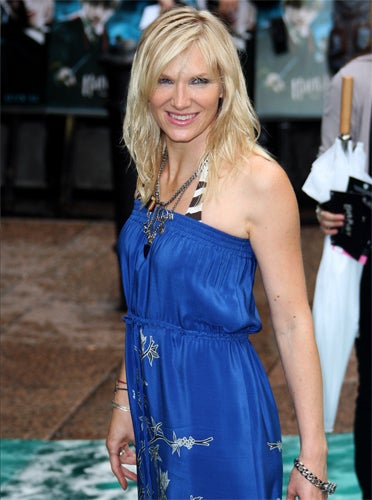An audience with the director general – you're kindly invited to take a pay cut
BBC's star presenters told to expect 25% to 40% salary reductions as Thompson seeks efficiency savings

Your support helps us to tell the story
From reproductive rights to climate change to Big Tech, The Independent is on the ground when the story is developing. Whether it's investigating the financials of Elon Musk's pro-Trump PAC or producing our latest documentary, 'The A Word', which shines a light on the American women fighting for reproductive rights, we know how important it is to parse out the facts from the messaging.
At such a critical moment in US history, we need reporters on the ground. Your donation allows us to keep sending journalists to speak to both sides of the story.
The Independent is trusted by Americans across the entire political spectrum. And unlike many other quality news outlets, we choose not to lock Americans out of our reporting and analysis with paywalls. We believe quality journalism should be available to everyone, paid for by those who can afford it.
Your support makes all the difference.The BBC director general Mark Thompson has called in some of the Corporation's highest-earning stars, including Jeremy Clarkson, Sir Terry Wogan and Bruce Forsyth, and warned them face to face that presenters must expect hefty pay cuts.
Stars from television and radio were invited to a special meeting on Tuesday on the sixth floor of Television Centre – where the BBC's most senior executives work – so that Mr Thompson could issue a bleak description of the Corporation's new working environment.
Although Thompson did not mention figures to the stars, the BBC is looking to renegotiate contracts with salary reductions of 25 per cent and for the highest earners as much as 40 per cent. It believes the going rate for presenting talent has been sharply depressed by economic pressures on commercial broadcasters and accepts criticism that it must not inflate the market by offering excessive salaries paid for by the licence-fee payer.
One BBC source said: "The real focus for us is on the top talent, that's where the market has changed most significantly." The BBC is aware that with ITV in financial difficulties, its biggest stars are in a weak negotiating position.
Earlier this month, Jay Hunt, the controller of BBC1, told The Independent that she was demanding that her stars took big pay reductions. "We are asking a lot of key talent to take sizeable cuts in their pay and in the main they've been quite receptive to that," she said. "If we have to lose people because they are not prepared to engage with us because of the efficiency agenda then we will lose them."
The BBC needs to deliver efficiency savings of £1.9bn by 2013. But although BBC executives have accepted a pay freeze, presenters and their agents are unhappy that the focus of salary-related cuts is on the people who front the BBC's most popular shows.
Tuesday's meeting was attended by around 100 presenters from all parts of the BBC, including Mariella Frostrup, Lenny Henry, Jo Brand and John Inverdale, along with senior Corporation executives. Thompson delivered an off-the-cuff speech in which he outlined the difficult economic conditions the BBC was now working in, emphasising the impact that talent salaries made on programme budgets.
But Alan Yentob, the BBC's creative director, who was responsible for drawing up the invitations, said it was incorrect to describe the meeting as a "grim" affair and said that nothing specific had been said to the stars about the size of pay reductions. He said: "It's about an equitable approach to talent costs in a climate which requires the BBC to be prudent and sensible. There's not some wholesale figure that's been thrown around. Mark outlined what challenges the BBC is facing, the opportunities creatively and the responsibilities to spend money wisely."
Yentob said that the purpose of the invitation to the presenters had to be to include them in discussions around BBC budgets rather than to reprimand them. The meeting ended with Forsyth taking hold of the microphone and delivering an impromptu skit about his loyalty to the BBC.
Sources close to Clarkson, who arrived late for the meeting, denied the suggestion that he had been "left reeling" by Thompson's address. Graham Norton and Chris Moyles, two of the BBC's best-paid presenters, were absent from the meeting, as was Jonathan Ross, who has been the focus of most public anger over excessive BBC pay at a time when the Corporation is supposed to be delivering cost efficiencies.
A House of Commons Public Accounts committee complained last week it suspected the BBC was overpaying radio stars but that the Corporation would not disclose to MPs details of presenter salaries.
BBC stars: What they earn
TERRY WOGAN
Presents: Wake up to Wogan (Radio 2)
Salary: £800,000
JONATHAN ROSS
Presents: Jonathan Ross Show (Radio 2) Friday Night with Jonathan Ross (BBC1)
Salary: £6m
JEREMY PAXMAN
Presents: Newsnight (BBC2)
Salary: £1m
GRAHAM NORTON
Presents: Totally Saturday (BBC1)
Salary: £2.5m
FIONA BRUCE
Presents: Ten O'Clock News and Crimewatch (BBC1)
Salary: £800,000
CHRIS MOYLES
Presents: The Chris Moyles Breakfast Show (Radio 1)
Salary: £630,000
STEVE WRIGHT
Presents: The Big Show and Sunday Love Songs (Radio 2)
Salary: £440,000
JOHN HUMPHRYS
Presents: Today (Radio 4)
Salary: £150,000
JO WHILEYPresents: The Jo Whiley Show (Radio 1)
Salary: £250,000
£1.9bn
Efficiency savings the BBC must make by 2013.
Join our commenting forum
Join thought-provoking conversations, follow other Independent readers and see their replies
Comments